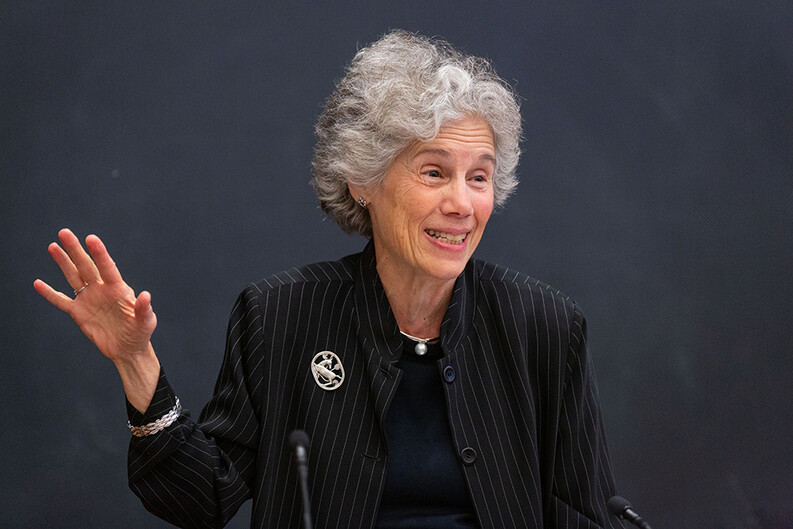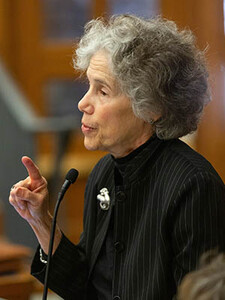Judith Resnik and Vicki C. Jackson ’75 Honored for Federal Courts Scholarship

Yale Law School’s Arthur Liman Professor of Law Judith Resnik and Harvard Law’s Vicki C. Jackson ’75 have been honored for their scholarship and teaching with the 2024 Daniel J. Meltzer Lifetime Achievement Award.
The Association of American Law Schools’ Section on Federal Courts established the award in 2017 to honor the late Meltzer, a member of the Harvard Law School faculty and White House legal advisor. The award recognizes professors of federal courts who have exemplified over the course of their careers Meltzer’s excellence in teaching, careful and groundbreaking scholarship, engagement in issues of public importance, generosity as a colleague, and overall contribution to the field. A committee, which this year includes incoming section chair Marin Levy ’07, selects the honorees.
The award presentation, which took place at the association's annual meeting in January, included readings of tributes sent from law professors around the country.

Amanda Tyler, Shannon C. Turner Professor of Law at Berkeley Law, described how Resnik and Jackson’s related — and at times collaborating — work has made its mark.
“It would be hard to overstate the massive and extraordinary contributions that Vicki and Judith have made to Federal Courts jurisprudence,” Tyler said. “But for me, it is not just that I consider their work consistently to be my “go-to” reference material, [but also] how they have both consistently used their positions to pave the way and lift up others to follow in their footsteps.”
Resnik, founder of the Arthur Liman Center for Public Interest Law4, teaches courses on federalism, procedure, courts, prisons, equality, and citizenship. Her scholarship focuses on the relationship of democratic values to government services such as courts, prisons, and post offices; the role of collective redress and class actions; contemporary conflicts over privatization; the relationships of states to citizens and non-citizens; the interaction among federal, state, and tribal courts and the forms and norms of federalism; practices of punishment; and equality and gender.

Jackson, the Laurence H. Tribe Professor of Constitutional Law at Harvard Law School, writes and teaches about U.S. constitutional law, federal courts, and comparative constitutional law. She is a co-author of a leading casebook and analytic overview of comparative law.
Together, Resnik and Jackson edited the 2009 book Federal Courts Stories, part of a series in which authors of chapters take key Supreme Court decisions and offer context by analyzing relevant history, economics, politics, and law. Both Resnik and Jackson were appointed by federal judges to task forces exploring the effects of gender in the federal courts — Resnik in the 9th Circuit, when she taught at the University of Southern California, and Jackson in the District of Columbia, when she was at Georgetown University.
Judith Resnik combines a fiercely independent scholarly integrity with a striking ability to look around the corner. And when she looks, she sees further than the rest of us.”
—James E. Pfander, Northwestern Pritzker Law
James E. Pfander, Owen L. Coon Professor of Law at Northwestern University Pritzker School of Law, praised Resnik for “almost single handedly” changing the way scholars think about federal courts, “encouraging those who write about the court system in the United States to reckon with more than what federal judges say in their opinions.”
Among Resnik’s many influential publications is the groundbreaking article “Managerial Judges,” the subject of a symposium in the University of Texas’s Review of Litigation and a 2022 conference at Yale Law School on the 40th anniversary of its publication5.
“Judith Resnik combines a fiercely independent scholarly integrity with a striking ability to look around the corner,” Pfander wrote. “And when she looks, she sees further than the rest of us.”
Pfander also noted that Resnik’s work increasingly concerns “what the numbers say about the way we finance, distribute, and ration justice in America.” Fines and fees in the justice system has been the topic of a recent Liman Center colloquium6 and other Liman projects and publications7.


